Fossil Fuels are a Foundational Element of Global Conflict


In this year of political discourse with its cacophony of talking heads, pundits and unsolicited opinions, facts and historical context often times get lost, if not deliberately disregarded. As it pertains to energy policy, and more specifically, foreign energy policy, as a country we can ill afford to keep the blinders on for much longer.
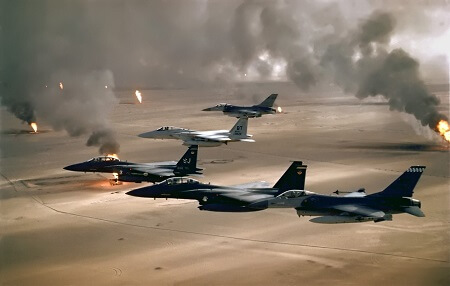
Our dependence on fossil fuels is fueling violent conflicts all over the world. Some oil corporations have become as powerful as states, while some states have become oil corporations in disguise, and both have resorted to extreme measures to maintain power and profits. Often we choose to ignore the facts on this subject, as they can be difficult to comprehend and we feel powerless to have any meaningful impact when it comes to something as extreme as global conflict.
It should be of no surprise that fossil fuels have played a significant role in global conflicts. Oil is one of the world’s most important and valuable commodities and is a major source of income for the governments and corporations that control its production and distribution. The United States is the world’s largest consumer of oil and past disruptions of global oil supply have damaged political reputations and cost millions of dollars to oil corporations and the overall economy. Politicians have used the concept of delivering freedom and democracy as a thinly veiled justification for protecting the "vital interests" of the United States and its allies.
The facts presented in the timeline below outline that oil considerations have dominated U.S. foreign policy decisions and that oil has been a foundational element of global conflict. Our political leaders and oil corporations have been pursuing a path of energy acquisition reliant on aggression, which has created global reactions leading to conflict for nearly a century. The abuse of power and the destruction go as far back as the early history of the oil industry in the 1900’s.
I often questioned if our nation was not so dependent on fossil fuels, how likely is it that these conflicts would have occurred? With our existing dependency on oil, how likely is it that conflict was going to continue? And ultimately what could we do as a human race to stop the turmoil?
Fossil Fuel Corporations Political Contributions Begin
The powerful influence the fossil fuel industry has had on U.S. policy has been evident since Standard Oil’s contribution of $100,000 to Theodore Roosevelt’s Presidential campaign fund of 1904. This contribution was equivalent to $9.8 million in today’s dollars. Despite the controversy that this raised over a century ago, the fossil fuel industry continues to contribute heavily to presidential campaigns. Since 1990, almost $500 million has been donated to presidential candidates from the oil and gas industries, while since 2010 $150 million is spent annually by fossil fuel corporations in their lobbying efforts.
Oil becomes the gateway to power and wealth …
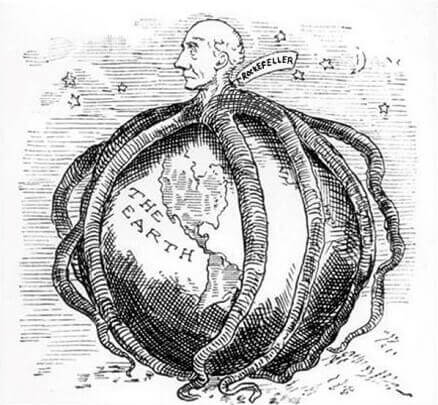
At first, the most significant discoveries of oil came largely from the United States, as it opened up its extensive territories with dynamic capitalism and technological prowess. But U.S. discovery soon peaked around 1930 and since then, Middle Eastern oil has been an attraction for those in political and corporate power in the U.S. Manifesting itself in 1938 with the discovery of oil in Saudi Arabia, the attraction to oil became an obsession as a means to secure wealth and power for the elite. This period saw the emergence of a political and corporate class determined to do whatever was necessary to maintain their status. It did not take long for the conflict to begin and in its path the unmerciful and tragic loss of lives.
1941… and the cause of war
During 1941, following the German invasion of Soviet Union, the U.S. cut off oil supplies to Japan. The U.S. Naval Forces represented the resistance preventing Japanese attempts to seize Southeast Asian oil supplies and raw materials in order to continue to power their military machines. With fuel supplies cut off, Japan attempted to cripple the U.S. Pacific fleet with a single strategic attack. This triggered Pearl Harbor and with it the tragic loss of life seemingly justified by oil.
1945Oil as an exchange for military protection
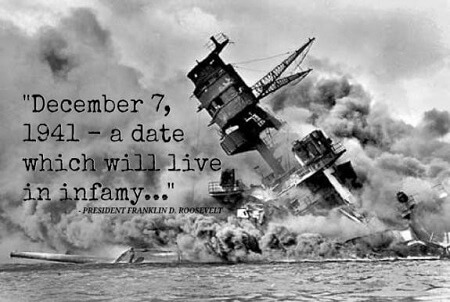
To secure supplies of oil, President Roosevelt made an agreement with King Abdul Aziz to provide military protection for the Kingdom of Saudi Arabia in exchange for oil. Oil made the Gulf region an integral part of the world economy and as a result, any conflict in the region was likely to involve the international community. For as long as the U.S relied on oil from the Gulf, our nation would be involved in conflict in this region.
Nations become oil corporations in disguise
Oil companies were not prepared to give up their profits without a fight and this fight was to be carried out by the U.S. and Britain. In 1953, the U.S. and Britain staged a coup d’état against the democratically elected government of the Prime Minister of Iran, Mohammed Mossadeq after he nationalized oil resources.
Cuba’s nationalization of U.S. oil refineries
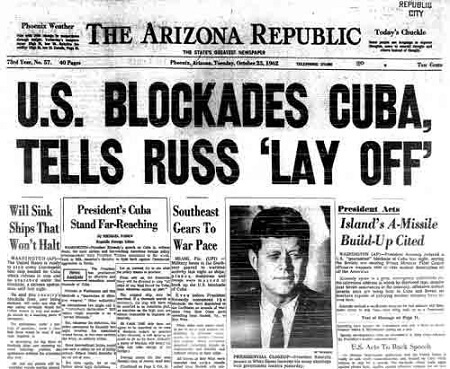
The implementation of trade restrictions between the U.S. and Cuba resulted in the U.S. ceasing supply of its oil to Cuba, severely impacting the economy of Cuba and driving them towards engagement with the U.S.S.R. Following talks during February of 1960, the U.S.S.R. agreed to support Cuba with supplies of oil in return for buying five million tons of sugar. In response, U.S. oil companies in Cuba refused to refine Soviet oil, leading to Cuba’s nationalization of Texaco, Esso and Shell oil refineries. Consequently, the U.S.S.R. and Cuban relations became stronger while the U.S. cut off all diplomatic relations. Ultimately, attempts to protect the profits of private U.S. oil companies lent support to one of the bloodiest and most repressive dictatorships in the history of Latin America.
1973Nixon vows to fight to protect foreign oil supplies
Throughout the 1970s, U.S. attention gradually focused on the Persian Gulf. The 1973/1974 oil crisis led to President Richard Nixon warning "...American military intervention to protect vital oil supplies."
1977Short lived hopes for a sustainable and united future
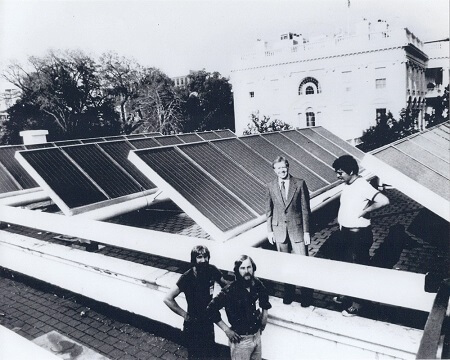
One of the earliest and most significant political realizations that global oil was soon to become in shorter supply was a speech delivered by President Carter in April 1977.
“Our decision about energy will test the character of the American people and the ability of the President and the Congress to govern. This difficult effort will be the "moral equivalent of war" -- except that we will be uniting our efforts to build and not destroy,” said President Carter. “Because we are now running out of gas and oil, we must prepare quickly for a third change, to strict conservation and to the use of coal and permanent renewable energy sources, like solar power.”
1980January - Carter's Doctrine
Despite an awareness of the need for alternative sources of energy, just three years later President Carter’s State of the Union Address outlined that military force was justified when acquiring supplies of oil from Persian Gulf.
"Let our position be absolutely clear: An attempt by any outside force to gain control of the Persian Gulf region will be regarded as an assault on the vital interests of the United States of America, and such an assault will be repelled by any means necessary, including military force," the President said in his address on January 23, 1980.
The language used by Carter inexplicably highlighted the perception that maintaining oil supplies or ‘vital interests’ through conflict was now a better means of securing our energy future than pursuing renewable energy sources. This was the first formal commitment of U.S. military power in the Middle East and set a precedent for the next three decades where the loss of human life was deemed a reasonable exchange for maintaining oil supplies.
March – Activation of the Rapid Deployment Joint Task Force
Just two months later, the activation of the Rapid Deployment Joint Task Force was announced with the primary objective to maintain the westward flow of oil from the Persian Gulf as outlined in Carter Doctrine.
September - Iraq attacks Iran
With its vast oil reserves, Iraq had built strategic importance for the international community and in particular for the U.S., which was keen to safeguard the supply of oil. From 1975, Iraqi oil revenues increased to an annual level of $8 billion and during the following years, nearly 40 percent of oil income was used to purchase modern weapons for Iraq. In addition, Iraqi active military manpower grew to 535,000 in 1980, according to the 2009 book "Conflict and Cooperation in the Gulf Region by Joseph Kostiner.
In September 1980, led by dictator Saddam Hussein, Iraq attacked Iran in its attempts to seize the oil rich provinces of western Iran. This invasion was openly supported by the Reagan/Bush administration with the flow of economic aid, weapons and military intelligence provided to Iraq during this period. Until its end in July 1988, the protracted war resulted in at least half a million casualties and several billion dollars’ worth of damages.
1990Oil fuels the Gulf War
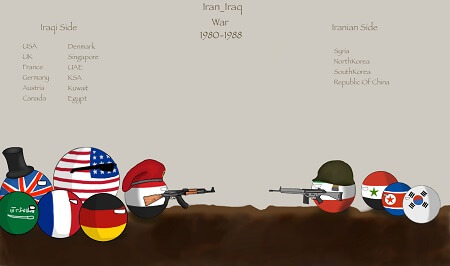
In July 1990, U.S. Ambassador to Iraq, April Glaspie, knowing Iraq planned to take a portion of Kuwait, informed Saddam Hussein that the U.S. did not have a position in “Arab-Arab” border disputes, essentially giving Saddam Hussein a green light to invade Kuwait.
Just one month later, convinced that the U.S. and U.N. would not stop them, Hussein and Iraq invaded Kuwait with the acquisition and control of Kuwait’s oil fields as Hussein’s primary interest. However, President Bush immediately proclaimed that the invasion “would not stand” and ordered Operation Desert Shield in response to Iraq’s invasion of Kuwait. With the free flow of oil from the Persian Gulf threatened because of Iraq’s occupation of oil-rich Kuwait, the U.S stepped in. This was yet another military intervention in response to the conflict caused by a global economy dependent on oil.
The U.N. and U.S. Federal Government response to the invasion of Kuwait was to levy sanctions against Iraq, with these sanctions remaining unchanged for over 10 years after the invasion. While the stated objectives of the sanctions were to respond to the threat that Saddam Hussein posed to peace and stability, it was ultimately the innocent citizens of Iraq who suffered the most. The sanctions impoverished the country and gave control of the nation’s oil supply to the U.S. and its allies through the Oil for Food Program, in which the United States was Iraq’s biggest customer.
Despite claims that the sanctions were not intended to hurt the people of Iraq, it has been identified that over one million Iraqis died as a direct consequence of the sanctions, with over half of these children. A 1999 United Nation’s report outlined that since the onset of the sanctions, almost one quarter of all Iraqi infants were born underweight and the same number malnourished.
1997Peak Oil - The end of oil is in sight
It was in 1997 that the concept of Peak Oil came to the frontier with the publication of “The Coming Oil Crisis” by Colin J. Campbell. Peak oil is the point at which global oil production peaks and can only go down. Campbell’s work highlighted that the growing Middle Eastern control of the market was likely to lead to a radical and permanent increase in the price of oil followed by physical shortages. The economic consequences of a reduced abundancy of cheap oil would impact countries in the form of rising oil prices and ultimately a loss of profits for oil corporations. The political ramifications of this would also be catastrophic and political leaders were determined to ensure that the effects of "Peak Oil" never materialized.
1998Political and Corporate Responses to Peak Oil – Trans-Afghan Pipeline
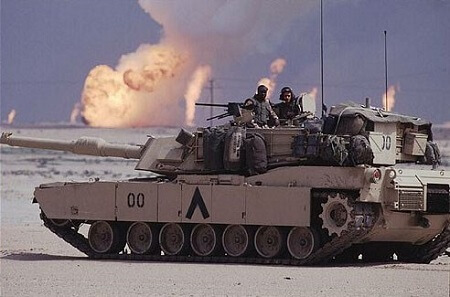
Much debate focused on when peak oil would be reached, but because of its inevitable occurrence, there was a necessity to move towards other fossil fuels such as natural gas. In attempts to secure natural gas, a meeting was held in Houston, Texas where a delegation from the Taliban in Afghanistan visited oil company executives to discuss trans-Afghan pipeline proposals.
However on February 12, 1998, John J. Maresca Vice President of the Union Oil Company of California, a key player in attempts to secure the trans-Afghan pipeline, testified before the House of Representatives. He outlined that the Taliban must be removed from power in Afghanistan and that until a single, unified, friendly government is in place, the trans-Afghan pipeline will not be built.
The political calming of Afghanistan translated in military terms to having an occupational force in Afghanistan, effectively for the policing of the pipeline. Despite the obvious challenges and risks in securing the pipeline, Dick Chaney, the Haliburton CEO at the time, outlined that:
“The good Lord didn’t see fit to put oil and gas only where there are democratically elected regimes friendly to the United States. Occasionally we have to operate in places where, all things considered, one would not normally choose to go. But, we go where the business is.”
It was also during this period that Cheney outlined the expected importance of the Caspian Basin for securing future supplies of oil. The Caspian Basin was hailed to be the savior for oil corporations, with early estimates showing that the region could have up to two thirds of the world’s known oil reserves.
1999Peak Oil is Publically Acknowledged by Oil Corporates
In 1999 Cheney publically acknowledged Peak Oil in his speech at the London Institute of Petroleum and highlighted that the “Middle East with two thirds of the world’s oil and the lowest cost, is still where the prize ultimately lies.”
2000The California Energy Crisis
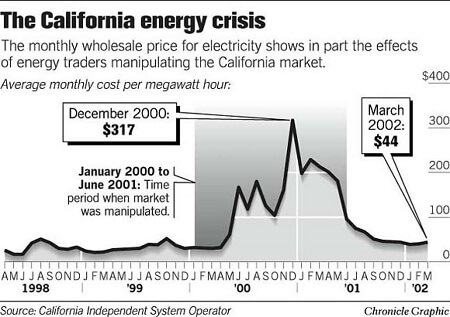
On May 22 1990, the California Independent System Operator, which manages the California power grid, declared the first Stage Two power alert, sparking the beginning of The California Energy Crisis. This was the first episode is a series of events throughout 2000 and 2001 which resulted in rolling blackouts, price volatility and poor service to the energy consumers of California.
The crisis was caused by a number of factors occurring simultaneously including regulatory failures, a shortage of electricity supply and illegal shutdowns of pipelines by Enron, the Houston based energy company. Combined, these factors represented a systemic failure of California’s electricity sector.
Evidence later emerged that while Californians were suffering from the chaos of rolling blackouts, Enron had taking advantage of the situation to increase its profits. It was found that Enron arranged to take plant’s off-line to create an artificial shortage and result in increased prices for their power, with Enron’s CEO Kenneth Lay infamously stating:
“In the final analysis, it doesn't matter what you crazy people in California do, because I got smart guys who can always figure out how to make money."
This period resulted in disarray for the ordinary energy consumers reliant on vulnerable and insecure utilities for their energy needs. From January 2001, the credit rating of both Southern California Edison and Pacific Gas & Electric utilities were downgraded to junk status. A desire for Californians to gain their energy independence was beginning to emerge and the California Energy Commission’s Emerging Renewables Program was launched by the State Legislature.
The Caspian Basin Oil Dream is Broken
This crisis coincided with the realization that the Caspian Basin was not going to be the solution in response to the inevitable decline of oil supplies. With 80% of the initial drilling resulting in dry wells, it was clear that projections which had been made were an over exaggeration. The problem of globally diminishing supplies of oil was set to become more of a problem that previously anticipated. Regardless, whatever oil that was present in the Caspian Basin was worthless until it was moved. The only route which made both political and economic sense was through Afghanistan.
Oil’s dirty influence on future foreign policy
The Project for a New American Century (PNAC) was a Washington based think tank funded primarily from the energy and arms industries. Of the 25 people who signed the PNAC's founding statement of principles, ten went on to serve in the administration of U.S. President George W. Bush, including Dick Cheney, Donald Rumsfeld and Paul Wolfowitz. The PNAC stated that U.S. control of Iraq transcended the issue of Saddam Hussein, outlining in their view that a "new Pearl Harbor" was needed to accomplish their foreign policy and military goals.
2001Bush, Cheney and the objective of energy acquisition reliant on aggression
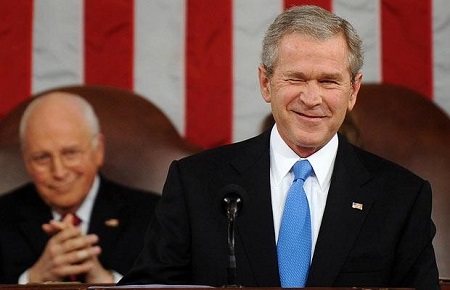
Shortly after the January 2001 inauguration of the Bush/Cheney administration, the very first cabinet meeting was held where initial discussions centered on how they were going to attack Iraq. Both these politicians had obvious ties to the oil industry and the energy task force of the administration soon examined oil fields which were located in the Middle East – where they were and what companies had business in them. The Bush administration had already chosen the path of war - not so much against terrorism - but by pursuing a path of energy acquisition reliant on aggression that stirred global reactions which lead to terrorism. Throughout the summer of 2001, many warnings from US allies and the CIA were received by the administration in Washington that outlined an attack was set to occur.
September 11
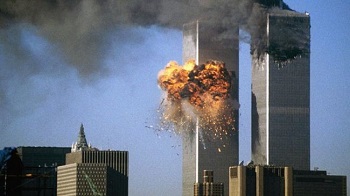
The September 11 attacks occured when a series of passenger airline hijackings and suicide attacks were committed by 19 militants associated with the Islamic extremist group al-Qaeda against targets in the United States. It remains the deadliest terrorist attacks on American soil in U.S. history. The attacks against New York City and Washington, D.C., caused extensive death and destruction. Some 2,750 people were killed in New York, 184 at the Pentagon and 40 in Pennsylvania.
Senator Max Cleland, member of the official National Commission on Terrorist Attacks Against the United States is quoted in the New York Times on October 27, 2003 as saying;
'As each day goes by, we learn that this government knew a whole lot more about these terrorists before September 11 than it has ever admitted.'
On October 7 2001, U.S. and British forces begin airstrikes in Afghanistan after the Taliban refused to hand over al Qaeda leader Osama bin Laden, who was widely blamed for the 9/11 attacks. However, the strategic importance of Afghanistan to securing access to Caspian Basin oil is deemed by political scientists as a contributing factor to the attacks. Afghanistan was crucial to the regional control and transport of oil in central Asia as Egypt was in the Middle East. But pipelines through Afghanistan would allow the US both to pursue its objective of attaining one of the most lucrative markets.
Wesley Clark Revelation
A number of weeks after 9/11, Wesley Clark, a retired General of the United States Army and former Supreme Allied Commander of NATO, revealed he was informed of a memo from the Secretary of Defense that planned to take out seven countries in five years, despite no link between these countries and the September 11 terrorist attacks. A former member of Clark’s Joint Staff told him that;
“This is a memo that describes how we’re going to take out seven countries in five years, starting with Iraq, and then Syria, Lebanon, Libya, Somalia, Sudan and, finishing off, Iran.”
Anthrax attacks
The 2001 anthrax attacks occurred within the United States over the course of several weeks beginning on September 18, 2001, one week after the September 11 attacks, and were targeted on the media and Democratic leadership. Letters containing anthrax spores were mailed to several news media offices and two Democratic U.S. Senators, killing five people and infecting 17 others. This was the catalyst for the creation of the USA Patriot Act passed in U.S. Congress.
Peak Oil as the motivator for allowing attacks
Michael C. Ruppert, author of "Crossing The Rubicon: The Decline of the American Empire at the End of the Age of Oil," identified from his evidence that it was evident that the September attacks were not a surprise and that Peak Oil had been a primary motivation for the allowing the attacks to take place. In a November 2001 presentation at Portland State University Oregon, Ruppert outlined that without the attacks it would have been impossible for the US to invade Iraq and take over their oil fields, which gave the U.S. a dominant military position in the middle of the world's main oil production region as we passed the point of Peak Oil.
2003U.S. invasion of Iraq – An energy war to safeguard oil
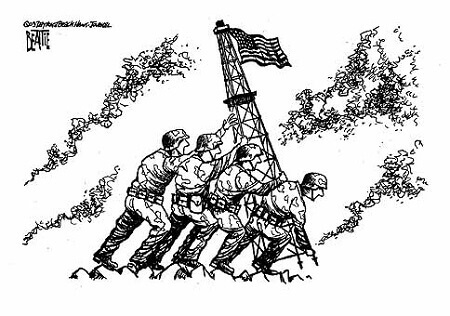
There have been many speculations as to the tactical reasoning behind the U.S. invasion of Iraq, but it is evident that this conflict was, at its core, an energy war. However, notwithstanding the factors that motivated the invasion, oil remained one of the core factors for the U.S. invasion of Iraq. Losing access to Iraqi oil presented an immense threat to U.S. interests and if this could not be prevented politically, it was likely to be done so militarily. With Iraq having the second largest supply of oil on the planet, the reality was that for all the publicity about liberating Iraq, the U.S. military effort was in actuality about safeguarding U.S. interests in the form of oil and preventing increasing oil prices because of dwindling supplies. While it is claimed that there was no winner in this war, in reality the U.S. oil companies won it.
2004Sullivan Solar Power Founded
In 2004, a small company was founded in Southern California with aspirations to move the region away from fossil fuels entirely. This company, Sullivan Solar Power, was started by San Diego native Daniel Sullivan.
Sullivan Solar Power pursued its mission to change the way the region and ultimately the world generates its electricity from humble beginnings as a one-man shop based in a garage, with just $2,500 of capital available.
Al Qaeda in Iraq becomes ISIL
In response to the invasion of Iraq by U.S. forces in 2004, an insurgency group known as Al Qaeda in Iraq launched an offensive against coalition forces in Fallujah. After several iterations of the group and multiple battles with coalition forces, it retreated into war-torn Syria in 2011 to regroup and rebuild. Al Qaeda relaunched in Iraq as ISIL, Islamic State of Syria and the Levant, and invaded northern Iraq, seizing oil assets and antiquities to fund its growth.
2010The Arab Spring
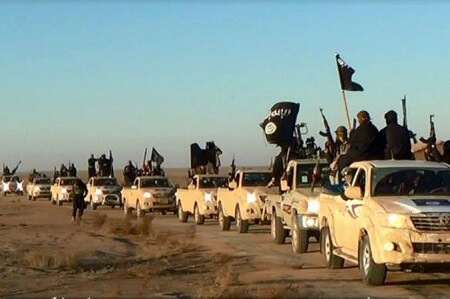
Sparked by stoked civil unrest in Tunisia, several of the countries outlined in Wesley Clark’s interview begin to fall and face severe civic unrest in what was known as The Arab Spring.
In the year since the beginning of the Arab Spring, leaders were ousted in Egypt, Tunisia, Libya and Yemen. The Tunisian Government was overthrown in January 2011 with President Zine el Abidine Ben Ali fleeing into exile.
In 2010, the U.S. and the U.N. intensifed Iranian Sanctions with the objective of impacting on Iran’s economy already subject to inflation, unemployment and corruption with the hope of creating further political disorder.
In March 2011, violence began escalating in Syria and the country descended into civil war as rebel brigades were formed to battle government forces for control of cities, towns and the countryside.
In August 2011, inspired by revolts in other Arab countries especially neighboring Egypt and Tunisia, violent protests broke out in Benghazi, Libya, leading to escalating clashes between security forces and anti-Gaddafi rebels. The Libyan Civil war resulted in the overthrow of the Gaddafi government and highlighted the political chaos and civic unrest as outlined by Wesley Clark in 2001.
2014ISIL, now known as ISIS, invades Iraq and a series of cities and strategic oil reserves fall under its control. Without oil revenue, ISIS would never achieve its objectives.
The recent funding of ISIS from oil revenues has brought the question of fossil-fuel related conflict to the present. Wide ranging research from the U.S. Department of the Treasury, U.S. Department of Defense, United Nations and UK Government has outlined that oil is a significant source of funding for ISIS providing up to 40% of their revenues. In 2014, it was producing 70,000 barrels a day worth $500 million annually. International sanctions prevented ISIS from selling this oil legally, so it has resorted to unregulated underground markets. But that's not hard. ISIS tapped into long-established smuggling routes that were set up back in the 1990s. Back then, Saddam Hussein used them to circumvent United Nations sanctions previously discussed. Recent airstrikes by the U.S. led coalition have reduced the ability of ISIS to transport and refine oil impacting on their revenues, however oil is still a significant revenue generator contributing to the organization’s global terrorism operations.
Conclusion
While ethnic, religious and political differences have undeniably been a significant cause of conflict over the past century, it is the potential for oil profits that has fueled these wars. Without the prospective profits and power that oil promises, most conflicts over the last one hundred years would either not have occurred or eventually come to an end as the revenue to buy weapons and pay fighters ran out. If we are to learn one thing from this, it is that control over oil has been a crucial factor in past global conflict and will be for future global conflict. Until oil does not bring profits to those in power, these vicious, brutal and tragic acts of the past will continue to occur, unless we break the chain.
A Better Way
Robert Ebel of the Center for Strategic and International Studies outlined to a State Department audience in 2002 that:
“Oil fuels more than automobiles and airplanes…Oil fuels military power, national treasuries, and international politics…it is a determinant of well-being, of national security, and international power for those who possess this vital resource, and the converse for those who do not.”
This is not an equitable way for society to continue to develop into the future, the well-being of our nation and planet should not be determined by our access to oil. We can do better, we owe it to our children and future generations.
The Solution
It was the addiction of world leaders and oil executives to power and profits which created the mess we as a human race are in. By ignoring the events of the past and allowing ourselves to become dependent on the one commodity that fuels this conflict, we are not without blame. But we have the ability to change, now more than ever before, there are ways to rid ourselves of our addiction to fossil fuels and end the dominance of oil corporations who have inflicted anguish upon millions across the world. We can power our homes and our cars with solar. We do not need the Middle East. We do not need fossil fuel corporations. We do not need corrupt politicians. We need to change.
Following the 2003 invasion of Iraq, it became abundantly clear that the solution to the world’s oil supply problem was the development of alternative sustainable and affordable sources of energy. That’s why in 2004 I founded Sullivan Solar Power with the goal of fundamentally changing the way this region and ultimately the world generates its electricity. At Sullivan Solar Power, we see the solar movement as a way to break the cycle, to take back political power by becoming independent of fossil fuel corporations. We must change the way the world generates energy. I will make every person I meet, and every organization I interact with, an advocate for solar power and I will build this movement. This is my life’s work. This is my mission. Onward.
I also have written about the irreparable damage California's investor-owned utilies have caused to our communities, further showing why we must break from fossil fuels now.